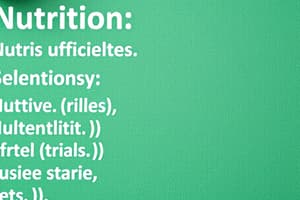Podcast
Questions and Answers
What distinguishes essential nutrients from non-essential nutrients?
What distinguishes essential nutrients from non-essential nutrients?
Essential nutrients must be obtained from food because the body cannot produce them in sufficient quantities, whereas non-essential nutrients can be synthesized by the body.
How do phytochemicals influence physiological processes in the body?
How do phytochemicals influence physiological processes in the body?
Phytochemicals can alter physiological processes by acting as bioactive compounds that affect body functions and overall health.
What are the roles of macronutrients in nutrition?
What are the roles of macronutrients in nutrition?
Macronutrients, which include carbohydrates, proteins, and fats, provide energy, support growth, and assist in various body processes.
In what ways can fiber contribute to digestive health?
In what ways can fiber contribute to digestive health?
Why is it important to distinguish between nutrients and non-nutrients in food?
Why is it important to distinguish between nutrients and non-nutrients in food?
Which of the following correctly describes the main purpose of food?
Which of the following correctly describes the main purpose of food?
What role do non-nutrient compounds like phytochemicals play in food?
What role do non-nutrient compounds like phytochemicals play in food?
Which of these is considered a macronutrient?
Which of these is considered a macronutrient?
What distinguishes essential nutrients from non-essential nutrients?
What distinguishes essential nutrients from non-essential nutrients?
Which of the following statements about fiber is incorrect?
Which of the following statements about fiber is incorrect?
Flashcards are hidden until you start studying
Study Notes
Learning Objectives
- Define key terms such as food, nutrition, health, wellness, and diet.
- Understand the factors influencing dietary choices.
- Grasp foundational concepts in food and nutrition.
Definition of Terms
-
Food: Essential items consumed for survival, health, growth, and energy required for physical activities.
-
Nutrients: Vital chemical compounds in food that:
- Regulate bodily functions.
- Support health and tissue repair.
- Provide energy for daily activities.
-
Essential Nutrients: Must be sourced from food; the body cannot synthesize adequate amounts.
-
Macronutrients: Primary energy sources, including:
- Carbohydrates
- Proteins
- Fats
- Water
-
Micronutrients: Vital for various bodily functions, including:
- Vitamins
- Minerals
-
Non-nutrients: Additional beneficial compounds in food such as:
- Phytochemicals: Plant-derived substances that contribute to color and taste; some can influence bodily processes (bioactive).
- Fiber: Indigestible plant components that can be broken down by gut bacteria; classified into:
- Soluble fiber
- Insoluble fiber
Learning Objectives
- Define key terms such as food, nutrition, health, wellness, and diet.
- Understand the factors influencing dietary choices.
- Grasp foundational concepts in food and nutrition.
Definition of Terms
-
Food: Essential items consumed for survival, health, growth, and energy required for physical activities.
-
Nutrients: Vital chemical compounds in food that:
- Regulate bodily functions.
- Support health and tissue repair.
- Provide energy for daily activities.
-
Essential Nutrients: Must be sourced from food; the body cannot synthesize adequate amounts.
-
Macronutrients: Primary energy sources, including:
- Carbohydrates
- Proteins
- Fats
- Water
-
Micronutrients: Vital for various bodily functions, including:
- Vitamins
- Minerals
-
Non-nutrients: Additional beneficial compounds in food such as:
- Phytochemicals: Plant-derived substances that contribute to color and taste; some can influence bodily processes (bioactive).
- Fiber: Indigestible plant components that can be broken down by gut bacteria; classified into:
- Soluble fiber
- Insoluble fiber
Studying That Suits You
Use AI to generate personalized quizzes and flashcards to suit your learning preferences.




